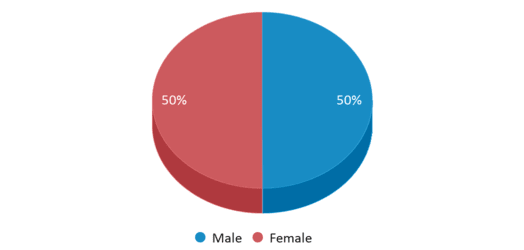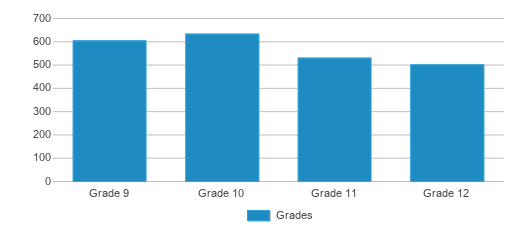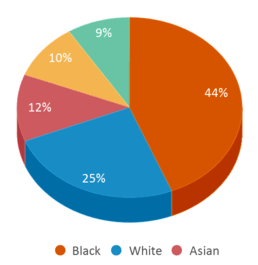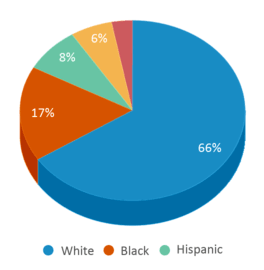Reynoldsburg High School serves 2,268 students in grades 9-12.
The student:teacher ratio of 19:1 is higher than the Ohio state level of 17:1.
Minority enrollment is 75% of the student body (majority Black), which is higher than the Ohio state average of 34% (majority Black and Hispanic).
Quick Stats (2025)
- Grades: 9-12
- Enrollment: 2,268 students
- Student:Teacher Ratio: 19:1
- Minority Enrollment: 75%
- Source: National Center for Education Statistics (NCES), OH Dept. of Education
School Overview
Reynoldsburg High School's student population of 2,268 students has stayed relatively flat over five school years.
Grades Offered
Grades 9-12
Total Students
2,268 students
Gender %

Total Classroom Teachers
120 teachers
Students by Grade

School Rankings
The diversity score of Reynoldsburg High School is 0.72, which is more than the diversity score at state average of 0.53. The school's diversity has stayed relatively flat over five school years.
Student : Teacher Ratio
19:1
17:1
American Indian
n/a
n/a
Asian
12%
3%
Hispanic
9%
8%
Black
44%
17%
White
25%
66%
Hawaiian
n/a
n/a
Two or more races
10%
6%
All Ethnic Groups


Eligible for Free Lunch
31%
42%
Eligible for Reduced Lunch
5%
5%
School Statewide Testing
School District Name
Source: National Center for Education Statistics (NCES), OH Dept. of Education
Profile last updated: 02/09/2025
Frequently Asked Questions
How many students attend Reynoldsburg High School?
2,268 students attend Reynoldsburg High School.
What is the racial composition of the student body?
44% of Reynoldsburg High School students are Black, 25% of students are White, 12% of students are Asian, 10% of students are Two or more races, and 9% of students are Hispanic.
What is the student:teacher ratio of Reynoldsburg High School?
Reynoldsburg High School has a student ration of 19:1, which is higher than the Ohio state average of 17:1.
What grades does Reynoldsburg High School offer ?
Reynoldsburg High School offers enrollment in grades 9-12
What school district is Reynoldsburg High School part of?
Reynoldsburg High School is part of Reynoldsburg City School District.
School Reviews
2 6/13/2011
The academic programs are tuned to the average child, meaning that children who are slower to learn are stressed beyond what is acceptable and exceptionally bright children are left learning the same thing for four years.
Too much money is spent on the sports center. The band is now extinct, the conductor moving to work in another district and the new one (who was experienced and unable to handle the children) left recently.
The art classes are grossly underfunded. They are conducted in nasty boiler rooms better suited for closet space (the only class that this could POSSIBLY be acceptable for is the Ceramics class). Plus, there are only three art teachers for the whole school. Three. That isn't enough to teach an entire school art.
Finally, the conduct of many teachers and staff in regards to regulation of the student body is atrocious. When a student is picked on, bullied, or ostracized, they do nothing. When a student informs them of the misconduct of another, they do nothing about the misconduct. When a student needs special help with social situations, the only teachers that bother to help are the Special Aids teachers who are PAID to! (admittedly, there are a few exceptions to this, but it is situation based on that individual teacher's perception of the world, not the students). The teachers and staff have no control over the student body. No discipline. No moral or ethical code solid enough to enforce!
The only good thing about Reynoldsburg was its deal with the Eastland-Fairfield Career and Technical Schools. At least they were nice enough to only ruin my first two years of High School! I won't even go back to get my diploma! I'm having it brought to me! Thats how bad Reynoldsburg is!
Review Reynoldsburg High School. Reviews should be a few sentences in length. Please include any comments on:
- Quality of academic programs, teachers, and facilities
- Availability of music, art, sports and other extracurricular activities
Recent Articles

What Is A Charter School?
Explore the world of charter schools in this comprehensive guide. Learn about their history, how they operate, and the pros and cons of this educational innovation. Discover key facts about charter schools, including admission policies, demographics, and funding, as well as what to look for when considering a charter school for your child.

10 Reasons Why High School Sports Benefit Students
Discover the 10 compelling reasons why high school sports are beneficial for students. This comprehensive article explores how athletics enhance academic performance, foster personal growth, and develop crucial life skills. From improved fitness and time management to leadership development and community representation, learn why participating in high school sports can be a game-changer for students' overall success and well-being.

February 05, 2025
Understanding the U.S. Department of Education: Structure, Impact, and EvolutionWe explore how the Department of Education shapes American education, from its cabinet-level leadership to its impact on millions of students, written for general audiences seeking clarity on this vital institution.









